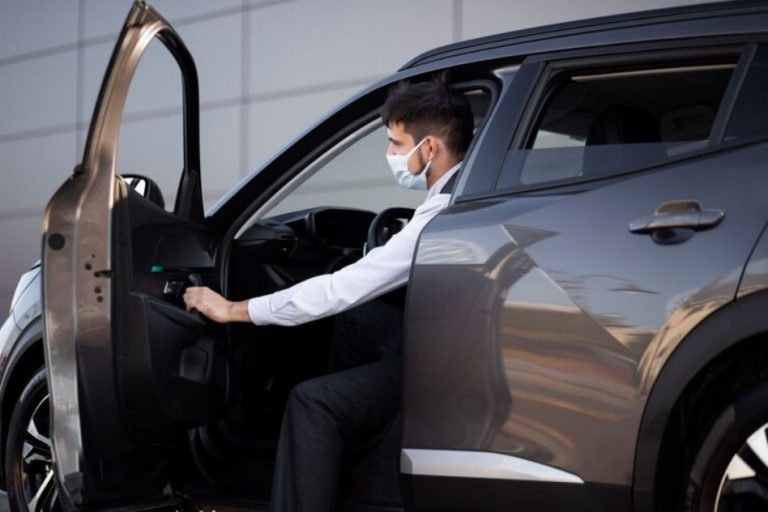Introduction
The COVID-19 pandemic has significantly impacted various sectors, with public transportation, particularly taxis, facing unique challenges. Farnborough Taxis play a crucial role in providing essential transportation services, ensuring people can get to work, medical appointments, and other critical destinations. However, the proximity of drivers and passengers in taxis necessitates stringent safety measures to prevent the spread of the virus. This blog outlines essential COVID-19 safety measures for Farnborough Taxis, offering valuable insights for drivers and passengers.
Importance of Safety Measures in Taxi Services
Safety measures in taxi services are paramount due to the confined space shared by drivers and passengers and the high turnover rate of passengers. Implementing robust safety protocols helps protect public health and restores passenger confidence in taxi services. Executive taxi Farnborough services have been vital during the pandemic, providing transportation for essential workers, vulnerable populations, and those without private vehicles. By prioritizing safety, taxi services can continue to fulfil this critical role.
Essential Safety Measures for Taxi Services
- Sanitization and Cleaning ProtocolsRegular disinfection of high-touch surfaces, such as door handles, seat belts, and payment terminals, is crucial for Farnborough taxi safety. Taxis should use EPA-approved disinfectants to ensure effectiveness against the virus. Cleaning should occur after each ride, with a thorough daily deep cleaning to maintain a high level of hygiene.
- Driver and Passenger HygieneBoth drivers and passengers should wear masks at all times to reduce the risk of transmission. Taxis should provide hand sanitizers for both drivers and passengers, encouraging regular use. Additionally, drivers should be trained to follow hygiene best practices, such as avoiding touching their faces and washing hands frequently.
- Vehicle VentilationProper ventilation is essential in reducing the risk of airborne transmission. Taxis should keep windows open whenever possible to allow fresh air to circulate. If windows cannot be opened, air purifiers with HEPA filters can help maintain air quality inside the vehicle.
- Contactless Payment SystemsReducing physical contact is vital in minimizing the spread of the virus. Taxis should encourage contactless payments through mobile apps, credit cards, or other digital payment methods. It not only enhances safety but also offers convenience to passengers.
- Health Screening and MonitoringRegular health checks for drivers can help identify symptoms early and prevent potential outbreaks. Taxi services should have clear policies for drivers who exhibit symptoms, including mandatory self-isolation and reporting procedures. Monitoring driver health ensures a safer environment for all passengers.
- Physical Barriers and ModificationsInstalling plastic barriers between the driver and passengers can provide an additional layer of protection. Encouraging passengers to ride in the rear seat further helps maintain physical distance. These modifications help reduce the likelihood of virus transmission within the confined space of a taxi.
Best Practices for Passengers
Passengers also play a crucial role in ensuring safe taxi travel. Here are some best practices for passengers:
- Pre-booking Rides and Avoiding Street Hailing Pre-booking rides through apps or phone calls can reduce the need for physical interactions. Avoiding street hailing helps minimize contact with potentially contaminated surfaces.
- Bringing Personal Protective EquipmentPassengers should carry their masks and hand sanitizers. Wearing a mask throughout the ride and using hand sanitizer before and after the trip can significantly reduce the risk of infection.
- Limiting Unnecessary Conversations and InteractionsMinimizing conversations and interactions during the ride helps lessen the potential for airborne transmission. Passengers should sit quietly and maintain distance from the driver whenever possible.
- Checking for Safety Certifications or SealsChoosing taxi services displaying safety certifications or seals can ensure that the service adheres to strict COVID-19 safety protocols. Passengers should look for such indicators when booking rides, particularly during Special Events in Farnborough.
Case Studies and Examples
Several taxi services worldwide have successfully implemented comprehensive safety measures. For instance, in New York City, many taxi companies have adopted rigorous cleaning protocols and mandatory mask policies and installed protective barriers in their vehicles. Similarly, in London, taxi services have introduced contactless payment options and regular health screenings for drivers. These examples demonstrate how effective safety measures can be in maintaining passenger confidence and ensuring safe travel during the pandemic.
The Role of Government and Industry Regulations
Government guidelines and industry regulations play a vital role in standardizing safety measures across the taxi industry. In many countries, transportation authorities have issued specific COVID-19 taxi protocols, including mandatory mask-wearing, regular vehicle disinfection, and health monitoring for drivers. Compliance with these regulations is crucial in ensuring a consistent and effective response to the pandemic. Taxi companies must stay informed about the latest guidelines and adapt their practices to protect drivers and passengers.
Conclusion
In conclusion, implementing essential COVID-19 safety measures in taxi services is critical in preventing the spread of the virus and maintaining public health. By adopting rigorous sanitization protocols, promoting driver and passenger hygiene, ensuring proper ventilation, encouraging contactless payments, conducting health screenings, and making physical modifications, taxi services can provide a safer travel experience. Passengers, too, must adhere to best practices to protect themselves and others. Together, drivers, passengers, and taxi companies can navigate the challenges of the pandemic and continue to provide essential transportation services. For additional insights on enhancing your taxi service, you might also be interested in reading about the top features to look for in corporate taxi services.
FAQ’s
Key COVID-19 safety measures for taxi services include:
- Regular sanitization of high-touch surfaces.
- Mandatory mask-wearing for drivers and passengers.
- Proper ventilation.
- Contactless payments.
- Health screening.
- Physical barriers between drivers and passengers.
It’s not recommended to take a taxi if you have COVID-19 to prevent potential transmission to others. Follow local health guidelines for isolation and seek alternative transportation if necessary.
COVID-19 has significantly impacted the taxi industry, leading to decreased passenger demand, increased safety measures, and the adoption of new technologies to ensure safety and compliance with health guidelines.





